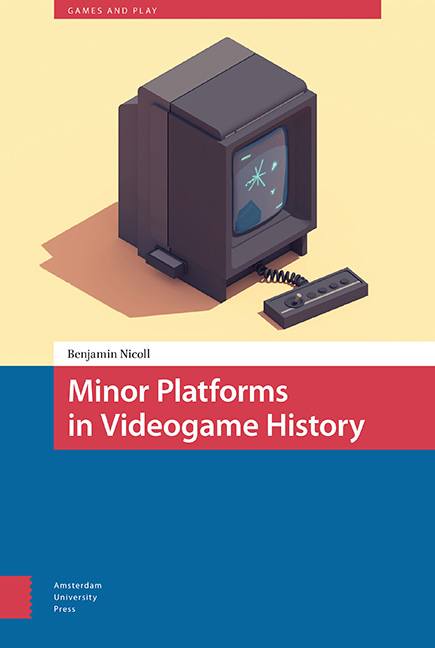Book contents
- Frontmatter
- Contents
- List of Tables and Figures
- Acknowledgements
- Introduction : Failed, Forgotten, or Overlooked? Methods for Historicizing Minor Platforms
- 1 Ways of Seeing Videogame History: The Vectrex as a Transitional Platform
- 2 Articulations of Videogame Piracy: The Zemmix as a Decolonial Platform
- 3 Domesticating the Arcade: The Neo Geo as an Imaginary Platform
- 4 A Dialectic of Obsolescence? The Sega Saturn as a Residual Platform
- 5 ‘How History Arrives’: Twine as a Minor Platform
- Conclusion: ‘Something new in the Old’
- Index
Introduction : Failed, Forgotten, or Overlooked? Methods for Historicizing Minor Platforms
Published online by Cambridge University Press: 21 November 2020
- Frontmatter
- Contents
- List of Tables and Figures
- Acknowledgements
- Introduction : Failed, Forgotten, or Overlooked? Methods for Historicizing Minor Platforms
- 1 Ways of Seeing Videogame History: The Vectrex as a Transitional Platform
- 2 Articulations of Videogame Piracy: The Zemmix as a Decolonial Platform
- 3 Domesticating the Arcade: The Neo Geo as an Imaginary Platform
- 4 A Dialectic of Obsolescence? The Sega Saturn as a Residual Platform
- 5 ‘How History Arrives’: Twine as a Minor Platform
- Conclusion: ‘Something new in the Old’
- Index
Summary
Abstract
This chapter defines key terms such as ‘minor’ and ‘platform’ and situates the book in relation to existing research on media archaeology, platform studies, and videogame history. It develops three core arguments with regard to the value of minor platforms for videogame and platform historiography: minor platforms inhabit moments of rupture, or periods of discontinuity and transitional instability in videogame history; minor platforms are useful as epistemic tools, insofar as their recalcitrance compels us to question what we think we know about videogame history and the ontological stability of our object of study; and minor platforms articulate alternative structures of feeling—that is, they can provide a window onto suppressed, unrealized, or oppositional cultural and affective patterns in videogame history.
Keywords: videogame history, failure, platform studies, minor, media Archaeology
Over three days in April 2014, a team of self-described ‘punk archaeologists’ (Caraher et al., 2014)—researchers, historians, and filmmakers—excavated a videogame trash dump in Alamogordo, New Mexico. The site of their dig was videogame history's most infamous e-waste deposit: the ‘Atari landfill’. This is a site where Atari had, in the midst of its financial collapse in September of 1983, buried thousands of unsold videogame cartridges, consoles, and computers. The three-day excavation yielded 1300 of approximately 700,000 buried videogames, barely scratching the surface of the 30-foot deep landfill. Many of the unearthed videogames remained surprisingly intact, despite sustaining damage as a result of their burial and excavation. The event subsequently made waves in the videogame community and even attracted widespread coverage in the mainstream press. A Canadian entertainment company facilitated the excavation and filmed the proceedings for a documentary. Alamogordo's city council even decided to take part in the event by auctioning many of the unearthed videogames on eBay. Suffice it to say, this was not a typical archaeological dig.
Perhaps the most unconventional aspect of the excavation was that it promised no surprise findings—nothing that would inspire a radical rethinking of the existing knowledge regarding the landfill and its deposits. Indeed, the excavated materials largely confirmed what was already known—that Atari, facing bankruptcy in 1983 because of internal mismanagement and a faltering North American videogame industry, buried thousands of its unsold products in a New Mexico desert.
- Type
- Chapter
- Information
- Minor Platforms in Videogame History , pp. 11 - 44Publisher: Amsterdam University PressPrint publication year: 2019



